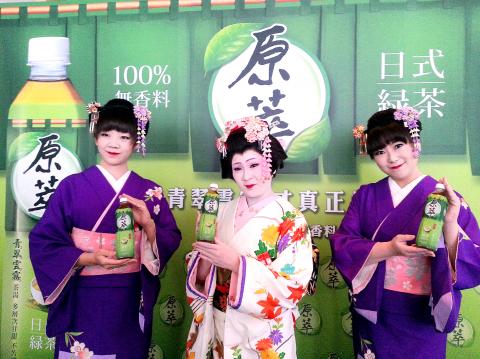Coca-Cola Co has rolled out its first bottled green tea in Taiwan as it seeks to grab a bigger slice of the nation’s profitable tea market.
Coca-Cola has a 5 percent market share of the Taiwanese tea market and aims to expand its share by 5 percentage points with the launch of the new product, Coca-Cola Taiwan general manager Kao Wen-hung (高文宏) said yesterday.
The new product, branded Yuan Tsui (原萃), is advertised as the first bottled green tea in the domestic market that contains Japanese matcha, is sugar-free and has zero artificial flavoring. It is priced at NT$25 (US$0.84) per bottle.

Photo: CNA
Tea products account for about 40 percent of the NT$50 billion local beverage market. Green tea has the largest share at 45 percent, or about NT$20 billion, bigger than that of black tea, oolong tea or milk tea, Kao said.
He expressed the hope that the company would become a giant in the bottled tea market, along with market leader Uni-President Enterprises.
A budget of NT$100 million has been allocated to promote the tea product this year, he said.
Over the next five years, Coca-Cola will be channeling more of its marketing efforts through social networking Web sites, Kao said.
This will be a break from the company’s previous marketing strategy, which relied heavily on TV commercials, accounting for 80 percent of the total budget, he said, adding that this figure is expected to drop to 50 percent.

Taipei has once again made it to the top 100 in Oxford Economics’ Global Cities Index 2025 report, moving up five places from last year to 60. The annual index, which was published last month, evaluated 1,000 of the most populated metropolises based on five indices — economics, human capital, quality of life, environment and governance. New York maintained its top spot this year, placing first in the economics index thanks to the strength of its vibrant financial industry and economic stability. Taipei ranked 263rd in economics, 44th in human capital, 15th in quality of life, 284th for environment and 75th in governance,

The Sports Administration yesterday demanded an apology from the national table tennis association for barring 17-year-old Yeh Yi-tian (葉伊恬) from competing in the upcoming World Table Tennis (WTT) United States Smash tournament in Las Vegas this July. The sports agency said in a statement that the Chinese Taipei Table Tennis Association (CTTTA) must explain to the public why it withdrew Yeh from the WTT tournament in Las Vegas. The sports agency said it contacted the association to express its disapproval of the decision-making process after receiving a complaint from Yeh’s coach, Chuang

Control Yuan Secretary-General Lee Chun-yi (李俊俋) tendered his resignation last night, admitting that he had misused a government vehicle, as reported by media. His resignation was immediately accepted by the Control Yuan. In a statement explaining why he had resigned, Lee apologized for using a Control Yuan vehicle to transport his dog to a pet grooming salon on May 20. The issue first came to light late last month, when TVBS News reported that Lee had instructed his driver to take the dog to the salon. The news channel broadcast photos that it said were taken by an unnamed whistle-blower, which purportedly showed the

A former officer in China’s People’s Liberation Army (PLA) who witnessed the aftermath of the 1989 Tiananmen Square massacre has warned that Taiwan could face a similar fate if China attempts to unify the country by force. Li Xiaoming (李曉明), who was deployed to Beijing as a junior officer during the crackdown, said Taiwanese people should study the massacre carefully, because it offers a glimpse of what Beijing is willing to do to suppress dissent. “What happened in Tiananmen Square could happen in Taiwan too,” Li told CNA in a May 22 interview, ahead of the massacre’s 36th anniversary. “If Taiwanese students or